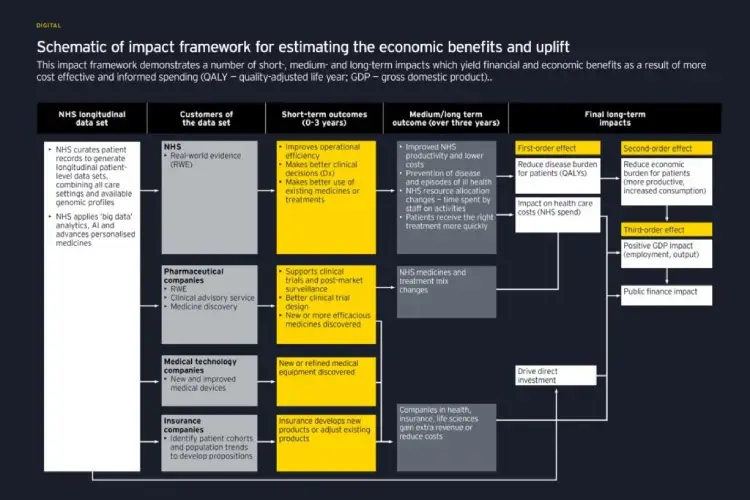
NHS data – held in some 55 million patient records – could be worth £5 billion each year to commercial partners, consultancy EY said in a new report published Friday, highlighting a further £4.6 billion in annual potential benefits to patients if the datasets of the single largest integrated health care provider in the world were put to use.
The latter could be realised through operational savings, and wider economic benefits generated through “Big Data”, AI and personalised medicine, EY claimed.
The report by EY’s Pamela Spence, from the company’s Global Health Sciences division, notes that creating a curated, accessible NHS dataset would be no mean feat, even before policy makers are brought round and privacy issues are tackled.
Cleaning and Curating Would Come with “Significant Costs”
“There will be significant process and technology costs associated with aggregation, cleaning, curating, hosting, analyzing and protecting the transformation of these raw data records into a consolidated longitudinal patient-level dataset,” she wrote.
“To ensure success the NHS and the UK government will need to partner with companies that can help unlock these valuable patient insights. Ultimately, analysis and insights generated from this unique NHS dataset can help the UK government achieve its health priorities on prevention, care and costs, place the NHS and the UK at the forefront of health care innovation, and make the NHS the envy of the world.”
NHS Data: 2019 Brought an AI Code of Conduct
Her report follows the publication of an AI code of conduct by the Department of Health earlier this year: ten principles that outline how the NHS should work with tech firms. The guidance came as enterprise interest grows in NHS data (a number of partnerships involving machine learning and NHS data are underway, many of them unpublicised), and also highlighted its commercial value.
“Technology providers derive significant value from the NHS beyond access to unique data sets – through medical and clinical involvement, test beds and pilots – and this value should be captured within the commercial arrangement,” the code notes.
See also: As More Companies Eye NHS Data Trove, Code of Conduct sets AI Boundaries
Responding to today’s EY report, Cleveland Henry, Director of Cloud at UKCloud (and NHS Digital veteran) said: “The high value of NHS patient data is a powerful testament to how far technology has taken us in recent years. It’s this patient data combined with clinical research that results in a much more informed and tailored health service.
He added: “To be successful, this requires a cloud computing environment that can handle the scale and complexity of genomics sequencing data. Legacy technology struggles to support such social progress, which is where cloud technology really shines — it’s the engine that powers connectivity, machine-learning, and more. Of course, all of this needs to be carried out with security as the number-one priority.
“Mishandling it at this stage could bring consequences that the NHS can’t afford to support, as such sensitive personal data can’t be compromised.”

The government is testing the idea of “data trusts” to own such relationships: legal structures designed to provide independent stewardship of public data.
Three pilots were concluded earlier this year. They came as policy makers fear that individual trials in which private sector partners are handed public data to run machine learning on are undervaluing that data.
The House of Commons’ Science and Technology Committee is among those to have urged the government to “realise more value” tied up in restricted public data sets, including those of the NHS, and hold them in such data trusts; including by demanding more from the companies granted access to it for research and development purposes.
The Committee’s May 2018 report, “Algorithms in decision-making”, noted: “The Government could… negotiate for the improved public service delivery it seeks from the arrangements and for transparency, and not simply accept what the developers offer in return for data access…”







